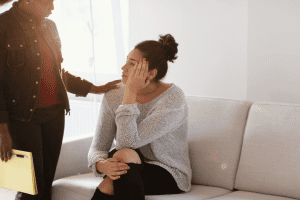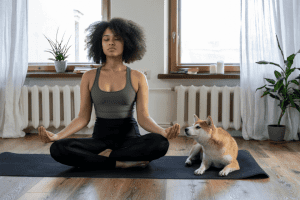We’ll help you navigate the newly reopened world by finding therapy that takes insurance and adopting anxiety management strategies.

The previous few years have been a stressful time for everyone. With a constantly changing COVID-19 pandemic, many had to cope with staying inside, unexpected career changes, and schooling from home. In a lot of ways, our lives have completely changed since the pandemic began. Because we had to spend so much time adjusting to all of the new social distancing protocols and restrictions on restaurants and bars, lots of people are finding it difficult to forget about all of the rules and get back to socializing. If you are feeling more tense than usual about heading out to social events, you might be wondering—“Should I explore therapy options for me?”
That’s why we’re here to learn how you can find a therapist that takes your insurance, explore how reentering the world after the pandemic can cause symptoms of social anxiety, and find additional ways to cope with social anxiety. It doesn’t matter if you had anxiety before COVID-19, or if you just began experiencing symptoms at large gatherings and social gatherings—we’re here to help. Let’s find out how you can manage symptoms of social anxiety as social distancing is phased out and people return to in-person work and socializing.
What Are the Symptoms of Social Anxiety?
Understand the symptoms of social anxiety so you know when to use your different coping mechanisms

Social anxiety manifests in many different ways.
Before we discuss ways to find therapy options that take insurance, we need to take the time to list the most common social anxiety symptoms and how they manifest as we return to group settings.
The most common symptoms of anxiety are tense feelings that make being in public uncomfortable. People who have social anxiety may also experience racing, distressing, or intrusive thoughts in social settings. More often than not, socially anxious people feel like the people around them are judging them or that they are unintentionally embarrassing themselves. There are physical symptoms of social anxiety, too. These symptoms include sweating, dizziness, fast heartbeat, and even nausea in some cases. The symptoms of social anxiety are sometimes so severe that people avoid social events altogether.
These symptoms are common as people return to life post-lockdown for a few reasons. The first reason is that we are all simply out of practice when it comes to being social. The other most common reason people experience social anxiety post-COVID is due to the protocols surrounding the pandemic. Many people are still not comfortable enough to confidently enter crowded areas. Since we are living in such unprecedented times, these are completely normal—if uncomfortable—feelings to experience.
Should I Find A Therapist? Will They Take Insurance?
For many people experiencing anxiety, seeing a therapist that takes insurance is a great way to help manage symptoms

Virtual therapy is an excellent solution for people nervous about in-person interactions.
A lot of people who experienced social anxiety before the pandemic actually reported periods of calm during the lockdowns. Since everyone was inside, there were no events or social engagements in the future to worry about. Even for people who did not previously experience symptoms of social anxiety before COVID, it can be difficult to adjust back to in-person work and crowded events.
Online or in-person therapy is a great way to talk about your anxious feelings as you re-enter the social world. The issue for many is that it can be hard to locate a therapist that takes your insurance. If you are interested in pursuing in-person therapy, then you should go to your insurance provider’s website and find a therapist in your area. When finding a therapist that takes insurance for in-person therapy, there are a few factors you need to consider—the most important factor being their physical location. You will want to pick a therapist that is easily accessible either by car or public transportation, otherwise, it may be too difficult to attend regular sessions. This is especially true for people who live in rural areas, as there are often fewer mental health options and in some cases, therapist’s offices are prohibitively far away.
For people who live in rural areas, people with very busy lifestyles, or people who are not yet ready to attend in-person therapy sessions, online therapy is an excellent option to help manage your symptoms. The catch is that a lot of online therapy services do not take insurance. There are several different services out there that have an accompanying application where you can chat with your therapist between sessions. These types of services are effective for managing symptoms but can cost you anywhere from $60 to $90 per week.
To find a remote therapist that takes insurance, we recommend locating a therapist through your insurance provider and asking them if they are willing to provide virtual therapy. In a post-COVID-19 world, many therapists are willing to accommodate clients who either live far away or are anxious about an in-person session. By choosing virtual therapy you can attend therapy sessions from the comfort of your home—and find a therapist that takes your insurance.
When you are speaking with your therapist, you can express all of the thoughts and feelings that you have regarding returning to in-person work, attending large events, and the rollback of mask policies. As we all navigate a tacit return to normal, your therapist will understand your fears and offer you ways to cope with your anxious thoughts.
Now that we know how to take advantage of online therapy that takes insurance, let’s explore some other ways that people are coping with post-COVID social anxiety.
Are There Other Ways to Manage Symptoms of Post-Pandemic Social Anxiety?
Beyond finding a therapist that takes your insurance, there are a few other solutions to help you overcome social anxiety

Meditation helps slow down racing thoughts.
Beyond attending therapy sessions, there are a lot of different ways that people are working through their pandemic-related anxiety. For people who experience milder symptoms, therapy may not be necessary. However, these mild anxiety symptoms are still not enjoyable and can prevent people from feeling comfortable in social settings. That’s why we’re exploring a few more solutions for people who are struggling with social anxiety.
Meditation and Mindfulness
Social anxiety symptoms often manifest as a tense, uncomfortable feeling. Some people report feeling “on-edge” before they are about to enter a social situation or return to the workplace. Meditation and mindfulness practices are excellent strategies to relieve these symptoms because they require relaxation. Many meditation exercises involve deep breaths, visualizations, and other techniques to help you stay calm. By taking a few minutes to meditate and center yourself before a social event, you may find that you aren’t feeling as anxious.
Acceptance
Another way that people who have social anxiety cope is through acceptance. As opposed to ignoring the nagging anxious feeling, it is more beneficial to address the feelings directly. Sometimes with acceptance comes a greater understanding of the situation, which will allow you to minimize the anxious feelings that appear before or during a social event. While this strategy will work for smaller worries, it is not recommended for bouts of intense anxiety.
Anticipate Your Anxiety
People who experience anxiety commonly have worries about the future. A common thought when attending a social event is—“What will everyone think of me?” These types of thoughts are normal for anyone to have, it is when these thoughts prevent you from socializing that they contribute to symptoms of social anxiety. Some common fears post-pandemic might be—“Should I wear a mask? What are the protocols for this event? What would happen if I would contract COVID?” These are all extremely valid concerns, but for people with social anxiety, they can become overwhelming. If you are able, you should do your best to anticipate these feelings before they arise. By anticipating your anxious thoughts, you can more effectively silence them in the moment and continue to enjoy yourself.
Don’t Consume Too Much Alcohol
If you start to get anxious feelings during a social event, it can be tempting to have a few drinks to calm yourself down. While there isn’t anything wrong with having a drink at a social event, having too much to drink can exacerbate anxious feelings. Even if alcohol has a relaxing effect on you, sometimes alcohol merely delays feelings of intense anxiety. Many people feel especially anxious the day after drinking because they drank excessively. Overall, alcohol may seem like a tool to help you cope with anxiety, but in reality, it often worsens anxious feelings.
If you are having trouble adjusting to a newly reopened world, you are not alone. More people than ever before are having symptoms of social anxiety as the pandemic winds down. For some, finding a virtual therapist may be the key to feeling their best. For others, meditation or yoga can help manage symptoms. The key is that you are taking steps to feel more comfortable in social situations. As long as you are searching for ways to minimize your anxiety, you are on the right track.









